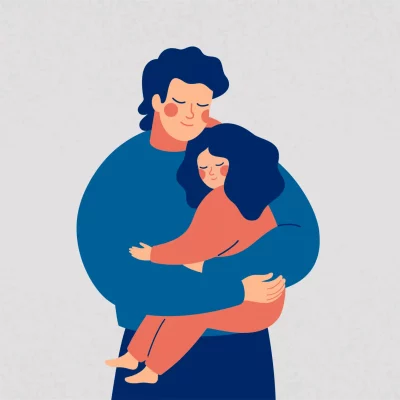As a parent, you want to do everything you can to help your child grow up and be successful. One of the most important things you can do for them is teaching them how to cope with stress and emotions in a healthy way.
Kids face many challenges these days, from academic pressure to social media, and it’s more important than ever that they know how to deal with their feelings.
In this blog post, we will discuss 5 effective coping skills for kids and helpful tips you can start implementing today with your kid.
What's the importance of coping skills for kids?
Kids need to learn how to cope with stress and emotions healthily for several reasons:
- It can help them succeed academically. When kids know how to deal with their emotions, they’re less likely to be distracted or overwhelmed by them. They can focus on their studies and do their best work.
- It can help them in their social lives. Kids who know how to cope with stress are more likely to have positive relationships with their peers. They’re less likely to lash out or become withdrawn when feeling overwhelmed.
- It can help them develop a strong sense of self-esteem. When kids know how to cope with their emotions, they feel more confident and capable. They know that they can handle whatever comes their way, which can lead to a more positive outlook on life.
- It can help them healthily deal with stress. When kids learn to cope with their emotions, they’re less likely to turn to unhealthy coping mechanisms, such as substance abuse or self-harm.
- It can help them in their future lives. Kids who know how to cope with stress are more likely to succeed in their careers and personal relationships. They’ve learned how to manage their emotions to focus on what’s important to them.
Now that we’ve discussed the importance of coping skills for kids, let’s go over the five coping skills for kids that are most effective.
Help them identify their feelings.
The first coping skill is helping them identify their feelings. Kids need to learn how to identify their emotions to deal with them healthily. One way to help them do this is to teach them about the different types of emotions.
There are six basic emotions: happiness, sadness, anger, fear, disgust, and surprise. Helping your child identify which emotion they’re feeling can be a helpful first step in teaching them how to cope with it.
You can also help them label their emotions by teaching them about the different intensity levels of each emotion. For example, they may be feeling happy, but they may also be feeling extremely happy. Or they may be feeling angry, but they may also be feeling very angry.
Teach them problem-solving skills.
The second coping skill is teaching them problem-solving skills. Kids need to learn how to identify and solve problems to deal with stress healthily.
One way to teach them problem-solving skills is to have them brainstorm solutions to a problem. For example, if they’re feeling stressed about a test, you can have them brainstorm different ways to study for it.
Another way to teach them problem-solving skills is to role-play different scenarios with them. For example, you can role-play a situation where they’re experiencing bullying at school. Through role-play, they can practice dealing with the situation in a healthy way.

Encourage them to express themselves through art or music.
The third coping skill is encouraging them to express themselves through art or music. Kids need to have an outlet for their emotions to deal with them healthily.
One way to encourage them to express themselves through art or music is to provide them with materials. For example, you can give them a blank notebook to draw in or a set of paints.
Another way to encourage them to express themselves through art or music is to participate in the activity with them. For example, you can sit down and draw with them or play a song together.
Help them develop a strong sense of self-esteem.
The fourth coping skill is helping them develop a strong sense of self-esteem. It’s important for kids to feel good about themselves to deal with stress healthily.
One way to help them develop a strong sense of self-esteem is to praise them for their accomplishments. For example, you can tell them that they did a great job on their test or that they’re a good friend.
Another way to help them develop a strong sense of self-esteem is to encourage them to try new things. For example, you can encourage them to sign up for a new activity or try a food they’ve never had before.
Teach them how to deal with stress in a healthy way.
The fifth and final coping skill is teaching them how to deal with stress healthily. Kids need to learn how to manage their stress to stay healthy physically and mentally.
One way to teach them how to deal with stress healthily is to have them practice relaxation techniques. For example, you can teach them how to do deep breathing or progressive muscle relaxation.
Another way to teach them how to deal with stress healthily is to provide coping statements. For example, you can tell them that it’s okay to feel stressed and that they can handle it.
Tips for parents
If you’re a parent, you can do a few things to help your child healthily cope with stress.
First, model healthy coping skills for your child.For example, if you’re feeling stressed, take some deep breaths or go for a walk. Modeling healthy coping skills for kids will show them that it’s okay to feel stressed and that there are healthy ways to deal with it.
Second, create a supportive environment for your child. For example, make sure that they feel safe and loved. Providing support will help them feel better about themselves and their ability to cope with stress.
Finally, be patient with your child. They’re still learning how to cope with stress healthily. So, don’t get frustrated if they make mistakes. Just help them learn from their mistakes and keep practicing healthy coping skills.
For more ideas on coping skills for kids check out this article from VerywellFamily, 15 Coping Strategies for Kids.
Specific ways to practice coping skills for kids today:
- Encourage them through prompts: You could say things like, “How did you feel today when X happened?” or, “I noticed you did Y; how do you feel about that?” The goal is to help them become more aware and learn what they need to do when different situations arise.
- Don’t save them from feeling bad: It’s okay for your kid to feel sad, angry, or frustrated. These are all normal emotions. What’s not okay is if they act out in destructive ways because of these emotions. So, let them feel their feelings and help them find healthy ways to cope with them.
- Use positive affirmations: Tell them things like, “You’re doing a great job” or, “I’m proud of you.” Affirmations let them know you see them and that you support them. It also helps boost their self-esteem and trust in their ability to cope with stress.
- Watch for negative coping skills: Some kids might start using unhealthy coping skills when feeling stressed. For example, overuse of screen time can be a way for kids to escape from their emotions. So, be on the lookout for negative coping skills and help your child find healthy alternatives.
Using these tips can help your child healthily cope with stress. Just remember to be patient, supportive, and encouraging. Finally, and most importantly, have fun! After all, that’s what childhood is all about.
If you have any questions about coping skills for kids or would like to talk to someone about therapy for kids and teens, schedule an appointment with Makin Wellness today.







